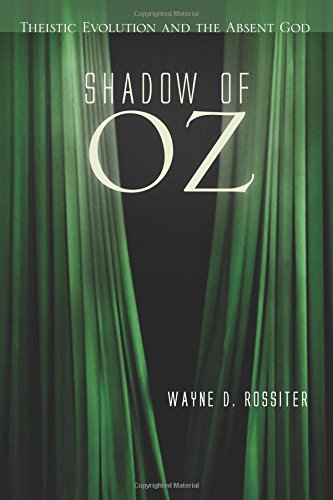 Wayne Rossiter, author of Shadow of Oz: Theistic Evolution and the Absent God, draws our attention to this BioLogos post by British evangelical writer and editor Robin Parry:
Wayne Rossiter, author of Shadow of Oz: Theistic Evolution and the Absent God, draws our attention to this BioLogos post by British evangelical writer and editor Robin Parry:
God is More Than an Intelligent Designer
The problem with Intelligent Design (ID) is its tendency to look for God (or simply a “designer”) in the gaps of scientific explanations. So-called irreducible complexity, for instance, is seen as evidence of this “designer” because science cannot (in principle, we are told) explain it in terms of natural processes. But if future science did actually explain any alleged instances of irreducible complexity, then such instances would cease to be evidence of the “designer”.
The problem here is that the “designer”—which almost every ID advocate thinks is the biblical God—is pictured as one being among others (albeit a more intelligent and powerful one) acting as a cause in the world in the same manner as other causes act in the world.
The reason that this is a problem, at least for Christians, is that classical theology does not picture God in this manner—as one cause or being among and alongside others. Rather, divine Being is of a fundamentally different kind from creaturely being, and divine causation acts at a different level altogether. God is the one who imparts be-ing to the whole of created reality and who enables all of the powers of causation within creation. So God was the explanation for the whole, but was not to be found in the gaps.More.
Rossiter offers a response at his own blog:
Misrepresenting the arguments
I haven’t blogged in a while, and this one will be brief. I noticed that Robin Parry offered a blog over at BioLogos today. This is kind of funny, given that Robin was my editor for Shadow of Oz (the awkwardness of having a theistic evolutionist edit a book critiquing theistic evolution!). Anyway, I just can’t help but think we should be well beyond the simplistic casting of the argument that guys like Parry seem to be offering. He either doesn’t understand the argument, or is intentionally misrepresenting it.-
“The problem here is that the ‘designer’… is pictured as one being among others (albeit a more intelligent and powerful one) acting as a cause in the world in the same manner as other causes act in the world. The reason that this is a problem, at least for Christians, is that classical theology does not picture God in this manner—as one cause or being among and alongside others. …
I’m not aware of any ID theorist or Christian who rejects the idea that God is immanent throughout His creation and exists as a fundamentally different kind of cause. But, what Christian could possibly deny that the God of the Bible does reveal Himself by directly intervening in the creation as a detectable cause? You would have to toss the Bible away entirely. I take it Parry doesn’t apply such restrictions in God’s action to Christ Jesus, who is both part of the eternal trinity and acted as a cause among causes on earth. To put it bluntly, Parry’s argument is incoherent. Unfortunately, it’s not his argument. He’s simply re-iterating what many theistic evolutionists have already said, and it didn’t work as an argument for them either. It fails entirely. More.
Hmmm. There may be a middle ground between incomprehension and intentional misrepresentation. The Bible, if it matters, is quite clear about God’s “hands-on”-ness in the way the world is made and works.
Theistic evolution, so far as I (O’Leary for News) can see, is a way of getting Christians to accept Darwinism and possibly naturalism (nature is all there is) as compatible with Christian faith. If my interpretation is correct, we could at least understand why so many theistic evolutionists need to debunk whatever evidence they see of design in nature, just as a Darwinian would. If a single instance of design would be fatal to their position, how do they differ from naturalists?
If this is a correct interpretation, the only way such a project can seem Christian is if the evidence and arguments provided by ID sympathizers are misrepresented—both to theistic evolutionists themselves and to their hearers. It’ not as if they can afford a straightforward analysis.
Thoughts from readers?
A friend says, by the way, that Parry’s post has a curious history: The November 2017 post is a repost of one from March 2016. The 2016 version features flagged comments from “Eddie” (“This post was flagged by the community and is temporarily hidden.”) The tipster notes that one can see Eddie’s comments by selecting “View Hidden Content” beneath the warning. Tipster did not find any offensive material there, just stuff like “The article is clearly written, and expressed in a praiseworthy moderate and conversational tone, but it treads well-worn ground. There are no arguments in it which have not been put forward against ID many times before. Let’s look at some of the points made…” Essentially, Eddie said much the same thing as Rossiter does above. But when the article was republished over a year later, Eddie’s comments had been “hidden.” (For some reason, Eddie is not popular at BioLogos or else there is a glitch, because all his posts seem to be hidden.)
But then that may be the best way for BioLogos to deal with actual ID arguments.
See also: Wayne Rossiter: Misuse of statistics at BioLogos?